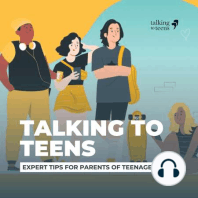22 min listen

Ep 91: Not Under My Roof!
Ep 91: Not Under My Roof!
ratings:
Length:
20 minutes
Released:
Jun 21, 2020
Format:
Podcast episode
Description
Click for full show notes, exercises, and parenting scripts from this episodeEvery parent wants their teen to find love one day. But maybe not while the teen is under their roof! For teens in American, being sexually active is considered a health risk. While sex at any age can come with risk of disease, infection, or unwanted pregnancy, many parents avoid talking about it, preferring to dismiss any relationships formed in high school as temporary--maybe even a distraction to our teens success!But are these well-intentioned efforts doing more harm than good? Certainly the chances of high school relationships lasting into adulthood are rather slim, but the consequences of denying that our teens are experiencing love and experimenting with sex are severe. The teen pregnancy birth rate in the US is around 19 per 1000 births--compare that to a country like the Netherlands who have a teen pregnancy rate of around 4.5 per 1000 births. With similar access to contraception as well as comparable economic advantages, what is it America is doing wrong when it comes to teenage relationships? Amy Schalet, author of Not Under My Roof: Parents, Teens, and the Culture of Sex, offers our listeners a unique perspective this week: raised by American parents in the Netherlands, Schalet shares her personal, historical, and sociological insights from researching the two countries’ opposing approaches to teenage sexuality. Interestingly enough, this issue stems back to medicine, of all places. In the United States, adolescent sex is viewed as a health risk. And the implications of that on American culture are incredibly strong. The fear and discomfort associated with perspective influences our culture, our upbringing, and our understanding of normalcy. And American parents use it to inform their household rules too. This often means no PDA, minimal conversations around sex, and certainly no sleepovers with adolescent partners. While such is quite normal in the United States, believe it or not, Holland approaches the matter differently altogether.In the Netherlands, family physicians view adolescent sex and teenage sexuality as part of the developmental process. This involves open conversations about love, sex, and contraception in the doctor’s office and the classroom starting at a young age. And thus, parents follow suit. Instead of viewing teenage sexuality as uncomfortable and cringy, Dutch parents are incredibly more open to it. Culturally, adolescent relationships are acknowledged, upheld, and welcomed in Dutch households. And surprisingly, they have the lowest rates of teenage pregnancy in the Western world! But does that mean American parents should start welcoming whoever their teen chooses over for a sleepover? Perhaps not. But it is worth considering how other cultures view teenage sexuality, and how American parents can take the lessons learned into their homes. When I asked Amy Schalet more about the differing attitudes surrounding this topic between the two countries, she noted that the main difference has to do with parental control, and parents’ understanding of their adolescents’ ability to self-regulate....Click for full show notes, exercises, and parenting scripts from this episode Among these fascinating topics and thought-provoking questions, Amy Schaelt and I discuss:
Hookup culture
Control and connection
Teenage relationships and their aspirations
More cultural comparisons between the U.S. and the Netherlands
Learn more about Amy Schalet’s cross-cultural insights and how they can help you build a stronger relationship with your teenager today!
Hookup culture
Control and connection
Teenage relationships and their aspirations
More cultural comparisons between the U.S. and the Netherlands
Learn more about Amy Schalet’s cross-cultural insights and how they can help you build a stronger relationship with your teenager today!
Released:
Jun 21, 2020
Format:
Podcast episode
Titles in the series (100)
Ep 25: Mental Strength for Teens: Amy Morin, bestselling author of 13 Things Mentally Strong People Don't Do, an expert on how to teach grit and emotional strength, discusses lessons she learned from her years as a foster parent to dozens of children and as a psychologist who helps famili by Talking To Teens: Expert Tips for Parenting Teenagers